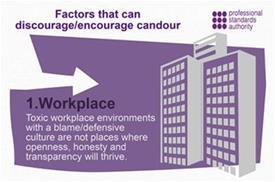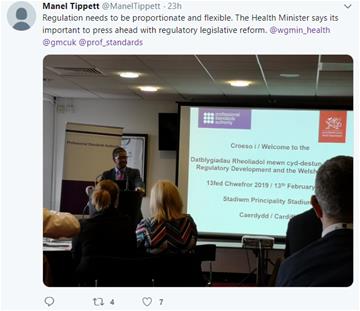Research and policy update

Telling patients the truth when something goes wrong – the professional duty of candour
In January we published our latest research report: Telling patients the truth when something has gone wrong. The paper looks at progress the professional regulators we oversee have made in embedding the professional duty of candour across the UK since 2014. The paper also sets out the factors that can encourage and discourage professionals from being candid. (The professional duty of candour means that health professionals should be open and honest to a patient when something has gone wrong in their care.)
We have previously reported on the professional duty of candour. In 2013, the government asked us to report on how regulators were encouraging candour after the Francis Report. It has been almost five years since we published our findings in 2014, so it seemed timely to reflect on what progress has been made by the regulators, but also look at what barriers remain to impede professionals from being candid.
The paper’s findings are based upon discussion groups with regulatory staff and fitness to practise panellists conducted by Annie Sorbie (Lecturer in Medical Law and Ethics at Edinburgh University) and questionnaires from regulators and stakeholders across health and care.
The paper makes the main following conclusions:
- Regulators have made progress with initiatives to encourage candour. However, measuring the success of these initiatives is difficult.
- Many of the barriers to professionals being candid remain the same as in 2014 when we last did work in this area, for example toxic work environments and fear of litigation.
- Regulators could create more case studies of candour scenarios. This would help to better explain to professionals when to be candid and the regulatory consequences of not being candid.
- Successful embedding of candour requires organisations across healthcare (not just regulators) to work together.
The report – Telling patients the truth when something has gone wrong can be downloaded from our website. There is also an infographic highlighting some of the key findings.
All our work on candour can be found here and you can also read the blog by our Policy Adviser, Michael Warren written for Sociology Lens, on Honesty is the best policy in healthcare, but how to make it a reality?
What makes a good regulator?
 This is the theme that will thread itself throughout the two days of this year’s academic conference. The conference is now fully booked, but you can still read the blog On regulation and ‘being good’ by Professor Deborah Bowman (pictured), Professor of Bioethics, Clinical Ethics and Medical Law, St George’s University of London. Professor Bowman is the academic lead for the conference and in her blog, introduces the question ‘what is it to be a good regulator?’
This is the theme that will thread itself throughout the two days of this year’s academic conference. The conference is now fully booked, but you can still read the blog On regulation and ‘being good’ by Professor Deborah Bowman (pictured), Professor of Bioethics, Clinical Ethics and Medical Law, St George’s University of London. Professor Bowman is the academic lead for the conference and in her blog, introduces the question ‘what is it to be a good regulator?’
We hope to provide more details about the conference, and perhaps an answer to the question, in the next issue of the newsletter. Find out more about our previous conferences, including watching the highlights from 2018 or reading through the presentations.
Joint event in Cardiff with the Welsh Government
The Authority held a follow-up to last year’s event in partnership with the Welsh Government on 13 February on the topic of Regulation and the Welsh Context at the Principality Stadium in Cardiff.
As well as an opening address from the Minister for Health and Social Care, who spoke about Welsh government priorities in health and social care, presentations covered topics ranging from developments in health education and training, regulation of social care in Wales, next steps for reform of professional regulation, the importance of patients in promoting safe care, the role of Accredited Registers as part of the wider public health workforce and the development of social prescribing in Wales.
There were also wide-ranging facilitated discussion covering the duty of candour and the role of regulation including the challenges of increasing divergence in approach across the UK. This benefited from the diverse views and experiences of attendees from regulators, professional bodies, charities, educators, patient bodies and health boards.
Overall we at the Authority found it a stimulating and engaging session and we look forward to future events and continuing to engage with stakeholders on these issues.
Consultation responses
We have recently responded to consultations from:
Find more of our responses to regulators’ consultations on our website.